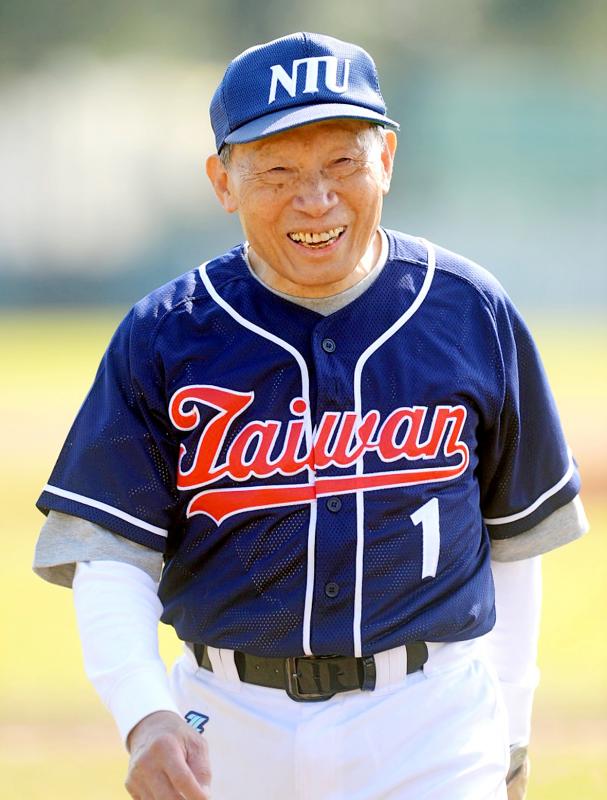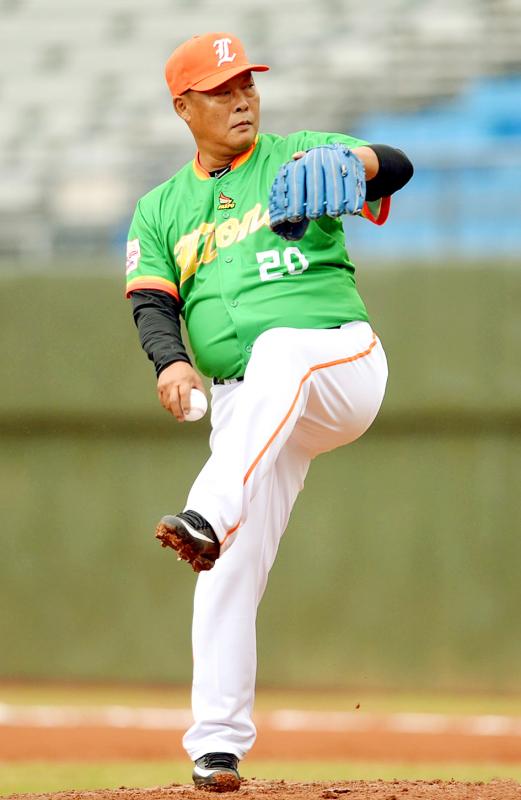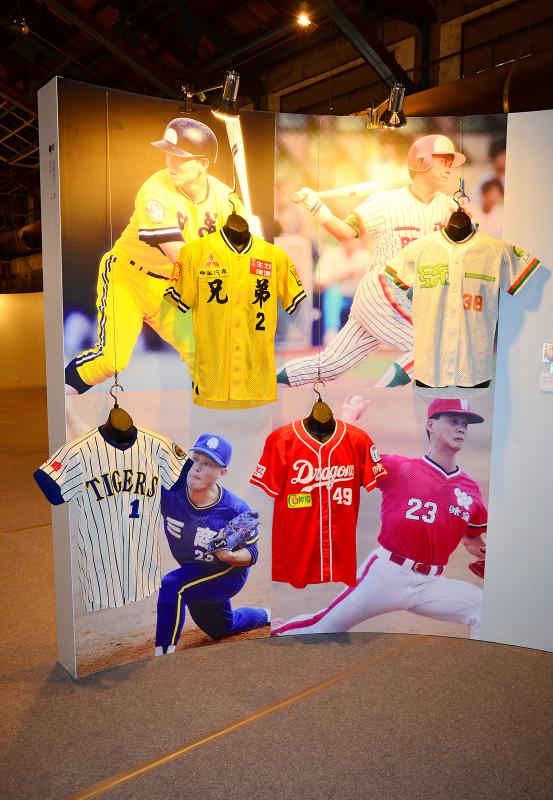March 13 to March 19
Wang Chun-liang (汪俊良) hit just two home runs over a five-year career, but his first one is enshrined in local baseball lore. On March 17, 1990, Wang’s feat extended the lead the Uni President Lions had over the Brother Elephants in Taiwan’s first professional baseball match, sealing a historic win.
During a pre-game guessing contest, the majority of fans thought that the day’s hero would be the Elephants’ “Mr Baseball” Lee Chu-ming (李居明).

Photo: Lin Cheng-kun, Taipei Times
“I was a dark horse, nobody guessed it would be me,” Wang recalls 18 years later in a Liberty Times (Taipei Times’ sister paper) article celebrating the CPBL’s 1,000th home run — also achieved by a Lions player. “My son was just three months old then, and maybe he brought me luck. But my conditioning was great, as we had been training hard year-round in the amateurs before going pro.”
Wang took home a color television set as a reward.
Footage of the historic event can be seen in a Chinese Television Service (華視) news clip on YouTube, which notes that Taiwan had become the fifth country in the world with a pro baseball league after the US, Mexico, Japan and South Korea. Later reports show that it was actually the sixth, as Australia kicked off its first season a year earlier.

Photo: Lin Cheng-kun, Taipei Times
Japan’s legendary home run king Sadaharu Oh opened the game as ceremonial batter, noting that “Taiwanese baseball is ready to start pulling in the crowds.”
The league flourished until it was hit by a massive game-fixing scandal in 1997. Attendance dropped by over 50 percent and it took years — and a merger with the rival Taiwan Major League to bring it back to relevance.
COMPANY SPORT

Photo courtesy of Wikimedia Commons
Taiwan already had a storied baseball history by the time of the league’s formation. The Japanese brought the sport to its colony, and the first team was formed in 1906 at today’s Taipei Municipal Jianguo High School. Taiwanese students had the chance to compete at Japan’s prestigious Koshien high school tournament, and in 1931 the underdog “Kano” team from Chiayi came out of nowhere to claim second place.
It remained a popular sport under the Chinese Nationalist Party (KMT), but the craze really took off in the 1970s as Taiwan’s youth teams dominated international competitions. The nation’s Little League, Senior League and Big League teams notched their first “triple crown” in 1974, infusing pride into a nation that was floundering diplomatically.
The teams repeated the feat in 1977, 1978, 1988, 1990 and 1991.
Interest in baseball waned during the 1980s. The nation’s economy was reaching new heights, and people turned their attention to other forms of entertainment and spiritual support. There was an active amateur league, but attendance was sparse and top-tier talent often left to seek overseas employment. The teams were mostly short lived — for example, both 1960s and 1980s attempts by soy sauce company Wan Ja Shan (萬家香) lasted just a few years.
The two mainstays were Taipower and Taiwan Cooperative Bank, which were both formed in the 1940s and still compete today. So many employees wanted to play that Taipower fielded teams at almost every location throughout the country, while an all-star squad represented the company in national tournaments. A government gig at Taipower was considered an “iron rice bowl,” making it an attractive option for good baseball players.
Wang played for Taipower prior to joining the Lions. He and six other teammates raised eyebrows when they quit the company to go pro.
“I had the least seniority of the bunch, with nearly 10 years experience [at Taipower],” he says. “Many people asked us why we would ever leave a government job, but we just wanted to fulfill our baseball dreams.”
FOUR ANIMALS
The CPBL officially launched in October 1989 at the Brother Hotel. Owner Hung Teng-sheng (洪騰勝), who was one of the main catalysts behind the league’s formation, was appointed secretary-general while Tang Pan-pan (唐盼盼) served as chairman. The founding four teams were the Brother Elephants, Wei Chuan Dragons, Uni President Lions and Mercuries Tigers.
Brother Hotel already fielded an amateur team that had been playing in the top league since 1984. It was the first baseball team in Taiwan to have its own stadium, which was built in Longtan (龍潭), Taoyuan in 1986. Hung spent great effort recruiting mostly-reluctant corporations to join the league, and is known today as the “father of professional baseball.”
Weichuan sponsored student teams until 1988, when it launched its own amateur squad that was talented enough to establish a quick rivalry with Brother Hotel. The two teams’ first pro showdown in Taipei on April 29 saw a packed house for the first time with 16,000 attendees — far above the season average of about 6,000.
The Tigers were a late addition after Evergreen Corp declined to join the league — Mercuries & Associates Holding chairman Chen Ho-tung (陳河東) was an old classmate of Hung’s.
The league designated 1990 as “Year One” of professional baseball and began aggressively promoting the first season.
The Eagles and Bears were added in 1992, and the CPBL — and baseball in Taiwan — thrived. School teams increased at all levels, and softball tournaments became popular events for inter-company mixers.
“To Taiwanese, baseball had become way more than just ‘going overseas and winning championships,’” writes Chang Jui-an (張瑞安) in an article on Taiwanese baseball history. “It was completely integrated into their lives.”
CRASHING DOWN
Things crashed to a halt in 1996, when a major game fixing scandal rocked the nation and teams who were denied entry to CPBL formed the rival Taiwan Major League .
Players were caught conspiring with underground gamblers to throw games, and sadly it wouldn’t be the first time that this happened with several more scandals to come.
A total of 22 players — most of the Eagles — were convicted after a years-long trial, although their sentences were all commuted. It was dubbed the Black Eagle Incident.
Attendance fell, as well as television ratings due the growing availability of US sport broadcasts. While the Whales were added in 1997, the Eagles, Dragons and the Tigers folded, bringing the number of teams back to four. The league struggled until Taiwan’s third place finish as host of the 2001 Baseball World Cup, rekindling public interest in the sport.
The two leagues merged in 2003 and things started to look up again — until the next scandal, the “Black Bear Incident,” hit just two years later.
Taiwan in Time, a column about Taiwan’s history that is published every Sunday, spotlights important or interesting events around the nation that either have anniversaries this week or are tied to current events.

Jacques Poissant’s suffering stopped the day he asked his daughter if it would be “cowardly to ask to be helped to die.” The retired Canadian insurance adviser was 93, and “was wasting away” after a long battle with prostate cancer. “He no longer had any zest for life,” Josee Poissant said. Last year her mother made the same choice at 96 when she realized she would not be getting out of hospital. She died surrounded by her children and their partners listening to the music she loved. “She was at peace. She sang until she went to sleep.” Josee Poissant remembers it as a beautiful

For many centuries from the medieval to the early modern era, the island port of Hirado on the northwestern tip of Kyushu in Japan was the epicenter of piracy in East Asia. From bases in Hirado the notorious wokou (倭寇) terrorized Korea and China. They raided coastal towns, carrying off people into slavery and looting everything from grain to porcelain to bells in Buddhist temples. Kyushu itself operated a thriving trade with China in sulfur, a necessary ingredient of the gunpowder that powered militaries from Europe to Japan. Over time Hirado developed into a full service stop for pirates. Booty could

Lori Sepich smoked for years and sometimes skipped taking her blood pressure medicine. But she never thought she’d have a heart attack. The possibility “just wasn’t registering with me,” said the 64-year-old from Memphis, Tennessee, who suffered two of them 13 years apart. She’s far from alone. More than 60 million women in the US live with cardiovascular disease, which includes heart disease as well as stroke, heart failure and atrial fibrillation. And despite the myth that heart attacks mostly strike men, women are vulnerable too. Overall in the US, 1 in 5 women dies of cardiovascular disease each year, 37,000 of them

Before the last section of the round-the-island railway was electrified, one old blue train still chugged back and forth between Pingtung County’s Fangliao (枋寮) and Taitung (台東) stations once a day. It was so slow, was so hot (it had no air conditioning) and covered such a short distance, that the low fare still failed to attract many riders. This relic of the past was finally retired when the South Link Line was fully electrified on Dec. 23, 2020. A wave of nostalgia surrounded the termination of the Ordinary Train service, as these train carriages had been in use for decades